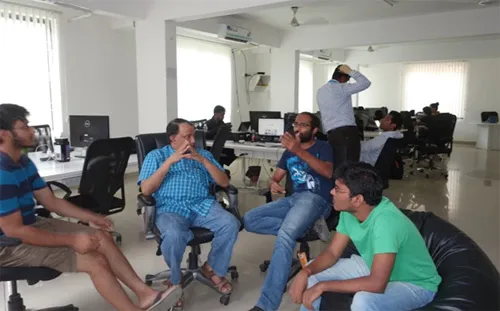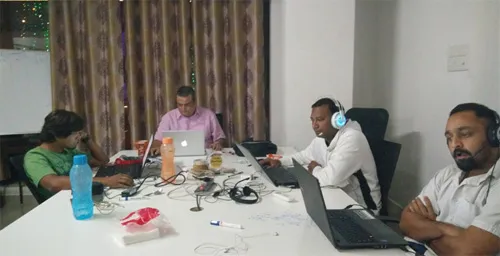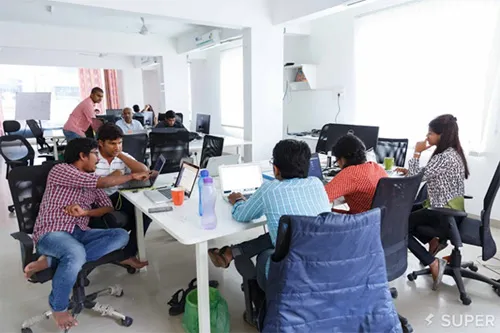Indians, passion and the startup revolution: what a French student learnt while interning at a Bengaluru startup
One of the first things I understood during my internship at an Indian startup was that knowledge grows when it is shared and not hoarded. Hence, here I am sharing my journey with you.
During my first year of engineering at Telecom Lille, France, I had the opportunity, to spend three months in India, interning at Synup.

Synup was founded two years ago and now employs almost thirty people. The company offers a tool to manage local marketing. It’s a fast-growing company that went cashflow-positive a few weeks ago.
This was my first real work experience and I was really happy to do it in such a small structure and, moreover, in a new country and a bustling city like Bengaluru. I was curious to learn and eager to share.
Initially, I was concerned about how I could make my mark here, and not be just a typical intern who does work rejected by other people. But after working with the team for a few days, I got clarity about how my journey would be.
When I first came in, I only knew the two founders of the company — Ashwin, the CEO, and Mohan, the CTO. Apart from them, I couldn’t figure out the company’s hierarchy; even the distinctions between the teams were difficult to find. I could just see a bunch of people sharing a workspace to make one idea reach maturity.

In the first week, I was working at one corner, when Ashwin brought the entire team in for a meeting. As I was just the intern I continued working, but he didn’t start before having my attention.
On that day, he shared that the company was in debt and that he wouldn’t give himself a salary before the company got cashflow positive — he even stopped shaving during this period to give a physical reminder. The entire team knew that it would take a lot of sacrifices, hardwork and cost-cutting to go positive. That was the day I really felt like I was an integral part of the team.
Everyone was really concerned about this announcement and I really felt an engagement from the entire team. We went positive a month later.
Transparency is the key
There is no distinction between different parts of the company. We work together; we are a team, we share everything.
Everyone here is aware of the health of the company, the product and the different projects everyone is working on. The sales of each day are on a whiteboard in the middle of the office and shared with the team. Everyone feels concerned about how the company is doing.
Always bringing new ideas
After a few weeks, I had plenty of time to fit in and get a better sense of working for an Indian startup.
There’s this urge to always bring something new to the company.

And that’s the whole point of living in a country of opportunities like India; “let’s try, if it does not work, we will try something else”. Always finding new ideas, and trying them before asking questions.
This, I learnt, is an intrinsic part of Indian culture. . This possibility to try new things, to fail without being judged, and give wings to anyone who comes up with new ideas. India is really the country of possibilities. Creating a startup or an app has become so easy that everyone is trying his luck. We can see this at the number of service apps that are available here. You need a cab? You have an app. A cook? You have an app. Someone to get your clothes to the laundry? You have an app for that as well! I almost never went out for lunch because of the numerous food delivery apps available here. And if most of those startups don’t survive after a few years, it is not because people didn't try.
India at work

Further, it made me question the competitive spirit in Europe. We are 700 million people working an average of 40-hour week, while in India 1.3 billion people spend 50 to 60 hours a week working. And people are doing their best not just to build their company, but to build a global business in India. They don’t work only for money; they work because they have this feeling of building something great. My whole idea of what working is has totally changed because of this internship.
But this gap in people’s minds came along with the Indian culture, living in a country where things still have to be done for the country; where you can help your people by trying to figure out a solution to difficulties.
Figure it out
I’ve been told this by coworkers almost every day — “figure it out”; learn, work, but do it yourself.
And if you are confronted by a difficulty, don’t try to avoid it. Fail if you have to, but try again.
Failing means learning, and learning is a major part of the Indian startup spirit .
One of the first things my mentor at the startup asked of me was to not waste time if he did not give me work. I was learning HTML/CSS at that time. He pushed me to create my own website, to document myself on my free time, so I could contribute more to the company. I thank him for this.
Moreover, everything possible was done to keep people in the office happy and motivated. During my first week, one person arranged everything I needed: a place to stay, a new SIM card etc. Everything is done to keep employees focused.
I’ve been doing a lot of things here at my internship, but I didn’t come to learn new skills. When I told my school that I wanted to do an internship in an Indian startup with some marketing expertise, they told me that the best thing I could do was learn to make a poster. Instead, I met passionate people loving their work and watched them grow. I came to learn from them and learn I did, more than I ever envisioned.
I will have a new internship come September and I think this experience will be extremely valuable. I came with a certain idea of what a startup is, of what working really means and of the engagement you can have with your company, and I leave with a completely different one.
(Disclaimer: The views and opinions expressed in this article are those of the author and do not necessarily reflect the views of YourStory.)







